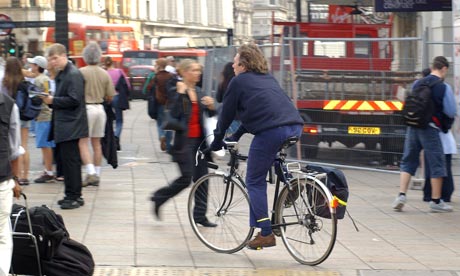Antisocial cycling is annoying - but not harmful
Instead of getting worked up about the perceived dangers of bad cycling, let's focus on changing the bad driving that killed 2,538 people on UK roads last year

A cyclist riding on the pavement in central London - not as dangerous as you might think. Photograph: Bernadette Lou/Rex Features
Why do those of us who venture out on two wheels run the risk of being called lycra louts or being compared to the evil overlord of a galactic empire? Take MP David Curry, who once said "the only time I have been knocked down in my life was by a cyclist going like a bat out of hell ... dressed like Darth Vader, as they all do!" Sadly, however, the idea that cyclists are a threat to civilisation seems to show no sign of abating.
Much of the concern with antisocial cycling focuses on jumping red lights and riding on the pavement. Both are illegal and have the potential to cause great annoyance to others, but do they actually cause harm?
There is no evidence that cyclists who jump red lights are particularly dangerous to anyone, including themselves. From 2001-05, only 2% of pedestrian injuries in London were the result of cyclists jumping red lights. During that same period, 55% of pedestrian injuries in London were the result of motorists jumping red lights. Jumping red lights is illegal for both cyclists and motorists, but it is much more likely to cause harm when motorists do it.
Cyclists should be where they belong – on the road. Cycling on the pavement is annoying, but it's not as dangerous as you might think. In the past 10 years, not a single pedestrian in London has been killed by a cyclist on the pavement - yet 54 pedestrians have been killed by motorists driving on the pavement.
Compared to other forms of illegal and antisocial behaviour, antisocial cycling is not particularly harmful. Of course, the rare instances when bad cycling causes injury and even death are tragic and should be investigated by the police. However, we need to put it in perspective: it is very rare, and that is why it hits the headlines when it happens.
Cyclists just aren't that much of a problem. Much illegal cycling is the result of ignorance and fear of cycling on hostile roads, rather than malice. I'd like to see all cyclists offered cycle training and cyclists who break the law required to undergo it.
For those who are about to shout "cyclists ought to be tested and licensed!", please understand that this would create a spectacular level of bureaucracy, not least of which would be delivering a theory test to a three year old. This would put people off cycling - and our society would miss out on the benefits that cycling provides to our health, environment, economy and quality of life.
There are millions of cyclists out there, and only one Darth Vader. Just like motorists, some are nice and some are nasty, and even the nasty cyclists are fairly harmless. Instead of getting apoplectic about the perceived dangers of bad cycling, let's focus on changing what killed 2,538 people on UK roads last year – bad driving.
• Debra Rolfe is the campaigns coordinator of CTC, the UK's national cycling organisation

Comments
I've seen this sort of
I've seen this sort of arguement before. as long as it doesn't hurt anyone, illegal cycling must be OK. THEN cyclists complain about hostility from motorists.
If you want to be treated as a road user with similar rights to the ones motorists and other road users, then behave to follow the same rules as motorists and other road users. over the last two weeks i've ridden over 500 km on State highways in the north Island, including SH1,2,3 and 4 an the vast majority of mororists and truckies were courteous and gave me lots of room. in turn I made an effot to let vehicles past if a pinch point mean I was holding them up, and I could do so safely.
Antisocial cycling may not kill many people but it WILL contribute to negative attitudes towards cyclists.
Stephen Wood , based in Central Otago